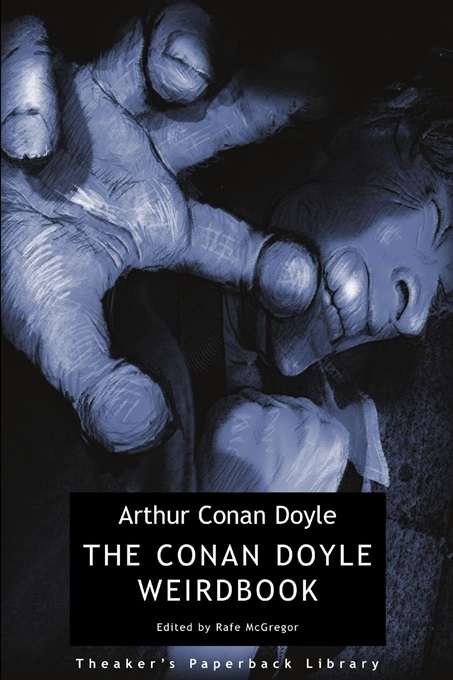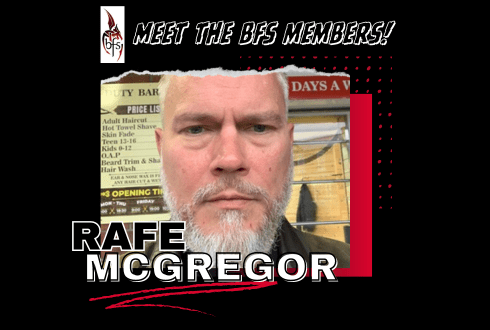Every Friday, we meet a member of the BFS and peer deep into their soul (or, at least, a form they filled out). Want to be featured? Email us: online@britishfantasysociety.org
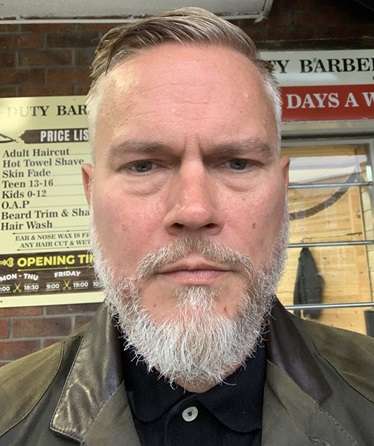
Name, including preferred pronouns:
Rafe McGregor (he/him)
Which region are you based in?
North-West
If you write, which genre:Â
Horror
Are you drawn to any specific SFFH sub-genres?
Occult detective fiction
Your influences
Tell us about the book/film/thing that got you into SFFH: What was it? How old were you? What impact did it have on you?
As a child, I was lucky enough to have my parents read Conan Doyle’s crime stories and M.R. James’ ghost stories to me. While I knew they were different genres, their effect – some combination of thrilling revelation and what James himself calls ‘pleasing terror’ – was the same. My mother had a modest Stephen King library and I remember reading Different Seasons, Thinner, The Dark Tower: The Gunslinger (the original edition), Skeleton Crew, and Cycle of the Werewolf very early. With the exception of Carrie, King is probably best known for his long novels, including doorstoppers like The Stand and It, but I think his novellas are his finest work.
My early experiences with genre fiction had two lasting impacts. First, a desire to combine the best of both genres in what I usually call ‘occult detective fiction’. Strangely – or perhaps not – this is extremely difficult to achieve and examples of great occult detective fiction are few and far between. Second, an intuition that the short story is the best vehicle for horror fiction and the novella the best vehicle for crime fiction. I’ve become a little more flexible on this over the years but still believe it’s very difficult to maintain the suspense and mystery that characterise both genres without resorting to belaboured plot devices or tedious genre clichés.
How does that early influence show up in your work now?
My tastes turned to crime fiction in my teens, I started writing for publication in my twenties, and encountered my fourth and final influence, H.P. Lovecraft, in my thirties. My reading of Lovecraft has changed over the years and ultimately I’m in agreement with Alan Moore, who places him alongside literary modernists such as Joseph Conrad, Virginia Woolf, James Joyce, and Franz Kafka. Unfortunately, like many of those modernists – Wyndham Lewis, Ezra Pound, and T.S. Eliot spring to mind – Lovecraft held morally reprehensible views.
(Pictured: H.P. Lovecraft; source.)
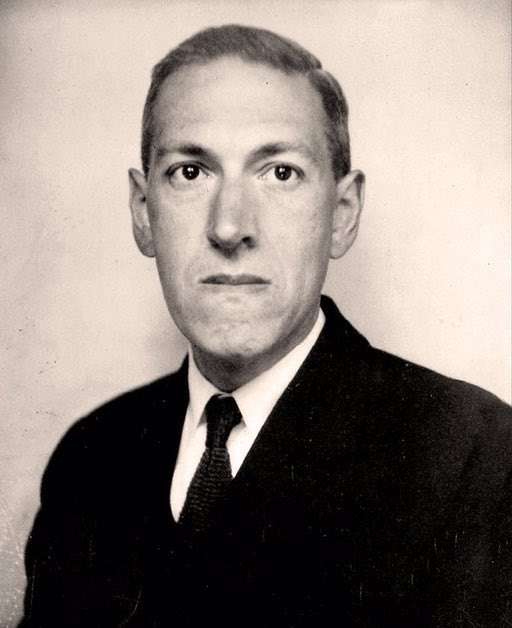
My first efforts at professional writing were three crime novels, followed by short stories in which I combined crime and horror. After an initial attempt with an occult detective whose three outings didn’t deserve publication, I created Roderick Langham, who is loosely based on a detective from the Sûreté. By this time, I was a regular contributor to the wonderful Theaker’s Quarterly Fiction (‘possibly the UK’s second longest-running sf/f fiction zine’, according to editor Stephen Theaker) and Theaker’s Paperback Library published The Adventures of Roderick Langham in 2017.
Where do you draw your creative inspiration from?
All fiction is about something – meaning something in the (real) world. I’m sure I don’t have to convince BFS members of this, but it’s my default opening with new colleagues in the workplace (a university). The ideas that fiction is ‘made up’ (true, but so is a large proportion of nonfiction), ‘false’ (itself false), and removed from reality (also false) make it easy to dismiss. Great fiction, whether genre or ‘literary’ (another distinction for which I have little time), is about things that are important to people, very often perennial problems with which humanity has grappled for millennia.
My short stories are not about those kind of things, although they do occasionally reflect on racism, sexism, and other social harms. My stories are about other stories, the genre fiction I have loved all my life – most obviously, the work of Doyle and Lovecraft, but also James, Edgar Allan Poe, and Bram Stoker. These authors, along with King, CaitlÃn R. Kiernan, Sarah Monette, and Victor LaValle, are my literary role models. I was also lucky enough to live in North-West Yorkshire for the middle part of my adult life and the region’s fascinating history and geography provided a more immediate source of inspiration.
Who do you look to as a genre hero? Why?
This is an easy one: Octavia Butler (1947-2006). Aside from being a literal and literary genius (in 1995 she became the first science fiction writer to receive a MacArthur Fellowship), her Parables duet almost defies description…perceptive, prescient, poignant…conclusive evidence that the distinction between genre and literary fiction is all but meaningless.Â
In addition to writing two book chapters on Butler, I have been privileged to read hundreds of pages of the journals and notes in The Huntingdon’s Octavia E. Butler Collection. I regard Butler as similar to pioneering sociologist W.E.B. Du Bois (1868-1963): were it not for interpersonal prejudice and structural racism (and likely also sexism in Butler’s case), they would both be canonical figures in their respective fields.
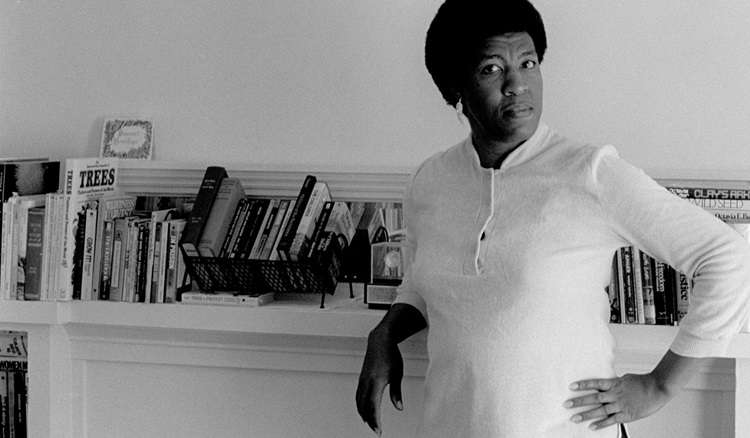
Your work
You’re stuck in an elevator for 60 seconds with that hero, and they want you to describe your work. Give us the pitch.
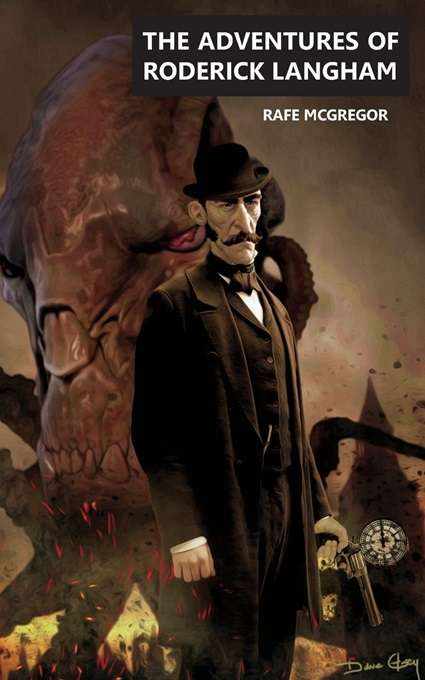
Roderick Langham is a retired soldier, disgraced police inspector, and reluctant occult detective. He inhabits the world of Sherlock Holmes, investigates cases with John Watson and Sebastian Moran, and perceives the reality concealed by the illusion of everyday appearances. The nine stories in The Adventures of Roderick Langham follow him from his first encounter with the inexplicable in the Himalayan hills to his investigation of the wreck of the Demeter and his growing realisation that the dales, moors, and wolds which surround his Yorkshire refuge are home to an evil far older than the honeycomb of medieval monasteries and Roman ruins suggests. Some of the adventures are crime stories and some weird tales, but each one presents the reader with a literary puzzle to solve – sometimes about its characters, sometimes about the narratives on which they are based, and sometimes about the authors who created those narratives.
What are you working on right now?
The Memoirs of Roderick Langham, which will be my second collection of occult detective stories.
Thinking about all the stories/work you’ve done, what sticks out most in your mind? Why?
I’ve written fifteen books to date and The Adventures of Roderick Langham has been by far the most successful. Two of the stories in the collection have been adapted as audiobooks, one as a radio play, and one translated into Japanese.
Where and when do you create/are you at your most creative?
I have an office at home, which is where I work best. I’m an early riser and most focused from about 0700 to 1300. After that, my concentration fades quickly so that I’m unfit for anything demanding after 1700.
What’s the best advice you’ve received about creativity?
The epigram, ‘genius is 1% inspiration and 99% perspiration’. Apparently it originated with an American academic named Kate Sanborn, but was appropriated by and attributed to Thomas Edison (a particularly despicable human being).
What’s your writing soundtrack?
Unlike most creative people, music isn’t very important to me and I’ve only used it to assist my writing once…I’m unsure how well that went!
The quickfire round
Sci-fi, fantasy or horror?
Horror
Quiet or loud?
Quiet
Dark or light?
Dark
Strict lines or genre blend?
Genre blend
Awards or bestseller?
Bestseller
Fiction or non-fiction?
Fiction
Poetry or prose?
Prose
Plotter or pantser?
Plotter
Reading or listening?
Reading
Notebook or computer?
Computer
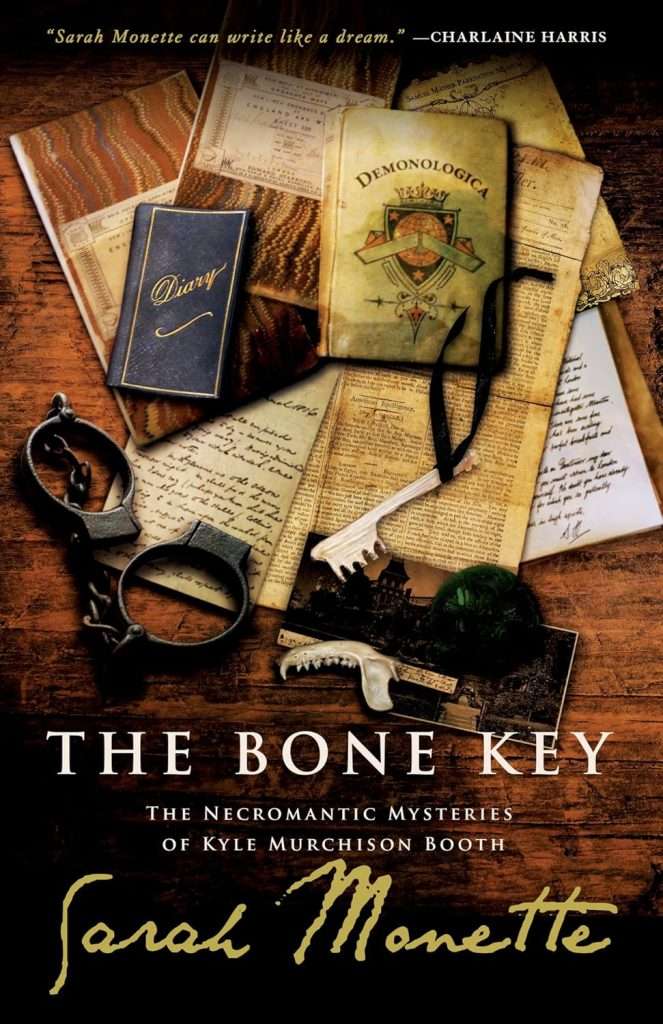
Favourite SFFH book of all time?
Sarah Monette’s The Bone Key
Last book you read?
James Herbert’s The Spear
Any SFFH author on auto-buy?
Stephen King
Favourite podcast?
I don’t know why, but I’m not a fan of podcasts…
The home stretch
What’s the best thing about being part of the SFFH community?
I love the flexibility of writing occult detective fiction: sometimes there will be a supernatural element, sometimes not…sometimes it’s crime fiction, sometimes it’s horror, sometimes it’s a bit of both.
Time to plug your stuff! Where can we find you and your work? What have you got coming up? Consider this your advertising space.
I can’t do any better than plug the wonderful (as I’ve already said) Theaker’s Quarterly Fiction, which is free to download and available in print very cheaply on Amazon.
My first publication with Theaker’s Paperback Library was an edited collection of Conan Doyle’s horror fiction, which is surprisingly good. The Conan Doyle Weirdbook is available print-only here.
The Adventures of Roderick Langham is available for free on various platforms here. The first of the forthcoming Memoirs, ‘The Lost Testament’, was published in Theaker’s Quarterly Fiction 60, which is also free. The next two memoirs have been completed but not published and I hope to have the collection ready for publication next year.
